
Mary Isobel Catherine Bernadette O'Brien, better known by her stage name Dusty Springfield, was an English singer. With her distinctive mezzo-soprano sound, she was a popular singer of blue-eyed soul, pop and dramatic ballads, with French chanson, country, and jazz also in her repertoire. During her 1960s peak, she ranked among the most successful British female performers on both sides of the Atlantic. Her image – marked by a peroxide blonde bouffant/beehive hairstyle, heavy makeup and evening gowns, as well as stylised, gestural performances – made her an icon of the Swinging Sixties.
List of notable events in music that took place in the year 1966.

Mighty Like a Rose is the 13th studio album by the British rock singer and songwriter Elvis Costello, released in 1991 on compact disc as Warner Brothers 26575. The title is presumably a reference to the pop standard "Mighty Lak' a Rose", and although that song does not appear on the album, the words of its first stanza are quoted in the booklet of the 2002 reissue. It peaked at No. 5 on the UK Albums Chart, and at No. 55 on the Billboard 200.

Dusty in Memphis is the fifth studio album by English singer Dusty Springfield. Initial sessions were recorded at American Sound Studio in Memphis, while Springfield's final vocals and the album's orchestral parts were recorded at Atlantic Records' New York City studios. The album was released on 18 January 1969 in the United States by Atlantic Records, and Philips Records distributed the record outside the U.S. Springfield worked on the album with a team of musicians and producers that included Jerry Wexler, Arif Mardin, Tom Dowd, conductor Gene Orloff, backing vocalists the Sweet Inspirations, bassist Tommy Cogbill, and guitarist Reggie Young.

Margrethe Blossom Dearie was an American jazz singer and pianist. She had a recognizably light and girlish voice. Dearie performed regular engagements in London and New York City over many years and collaborated with many musicians, including Johnny Mercer, Miles Davis, Jack Segal, Johnny Mandel, Duncan Lamont, Bob Dorough, Dave Frishberg, and Jay Berliner.
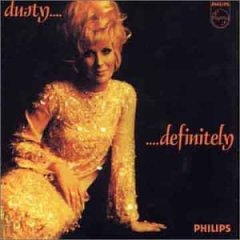
Dusty... Definitely is the fourth studio album by singer Dusty Springfield, recorded and released in the UK in 1968. Production credits go to both John Franz, and for the first time, Springfield herself. The songs on this album were chosen because Springfield "liked them", as stated in the liner notes. Like the vast majority of her LPs, the album shows a diverse range of styles ranging from soul, pop, folk to lounge.
Jeffrey Ovid Clyne was a British jazz bassist.

Jay Leonhart is a double bassist, singer, and songwriter who has worked in jazz and popular music. He has performed with Judy Garland, Bucky Pizzarelli, Carly Simon, Frank Sinatra, and Sting. Leonhart is noted for his clever songwriting, often laced with dry humor. His compositions have been recorded by Blossom Dearie, Lee Konitz, and Gary Burton. His poetry is published both in, and outside of, the venue of song.

See All Her Faces is the seventh studio album by singer Dusty Springfield, originally released on the Philips Records label in 1972. It contains a mixture of tracks from different recording sessions; some tracks were recorded with Jeff Barry for an aborted third album for Atlantic Records, other tracks were recorded for Philips in the UK between April and July 1970 – these came to be Springfield's final recordings with longtime producer and arranger Johnny Franz. Some, such as "Willie and Laura Mae Jones", recorded with Jerry Wexler, Tom Dowd and Arif Mardin, had been previously released as singles in the US. See All Her Faces collects many of those tracks, recorded from 1969 to 1971, placing seven of the British recordings on Side A, while Side B comprises tracks recorded both in the UK and the US. As a result, the album has no cohesive sound, but offers many different styles of music. The album boasts eight producers, including Springfield herself. It has been suggested that See All Her Faces is best appreciated track by track, rather than as a whole stylistic statement, as her album Dusty in Memphis is often praised to be.
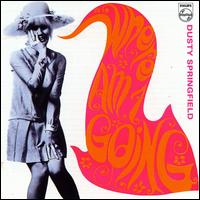
Where Am I Going? is the third studio album by singer Dusty Springfield, released on Philips Records in the UK in 1967. By now, firmly established as one of the most popular singers in Britain, with several hits in America as well, Springfield ventured into more varying styles than before and recorded a wide variety of material for this album. Rather than the straightforward pop of A Girl Called Dusty or the mix of pop and soul of Ev'rything's Coming Up Dusty, Springfield recorded a variety of styles from jazz to soul, to pop and even show tunes. While not the success that her previous two albums were, Where Am I Going? was praised by fans and critics alike for showing a mature and sophisticated sensibility, despite the many different styles of music.

Longing was to have been Dusty Springfield's second LP for the ABC Dunhill Records label, and ninth studio album overall, recorded in 1974 and planned for release the same year. Most of the Longing recordings were mixed and released much later on the compilations Simply Dusty (2000) and Beautiful Soul: The ABC Dunhill Collection (2001).
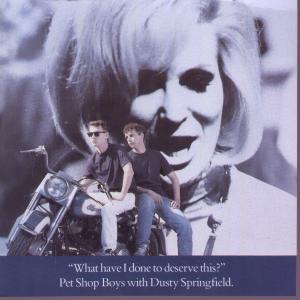
"What Have I Done to Deserve This?" is a song by English synth-pop duo Pet Shop Boys and soul singer Dusty Springfield, taken from the duo's second studio album, Actually (1987). The song was released as the second single from the album on 10 August 1987.
"Wishin' and Hopin'" is a song, written by Hal David and Burt Bacharach, which was a US Top 10 hit for Dusty Springfield in 1964.
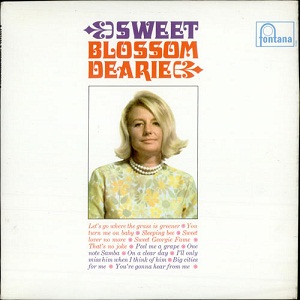
Sweet Blossom Dearie is a 1967 live album by Blossom Dearie.

Norma Cecilia Tanega was an American folk and pop singer-songwriter, painter, and experimental musician. In the 1960s, she had a hit with the single "Walkin' My Cat Named Dog" and wrote songs for Dusty Springfield and other prominent musicians. In later decades, Tanega worked mostly as a percussionist, playing various styles of music in the bands Baboonz, hybridVigor, and Ceramic Ensemble. She also wrote "You're Dead", which was used as the theme song of the film What We Do in the Shadows and the TV series of the same name.

Just a Little Lovin' is the tenth studio album by Shelby Lynne, released in the United States and Canada on January 29, 2008. The album is a tribute to British singer Dusty Springfield, and features covers of nine songs popularized by her, in addition to "Pretend", an original song written by Lynne. In contrast to the more fully instrumented original versions Dusty Springfield recorded, Lynne's remakes featured sparse arrangements, favoring acoustic guitars and pianos rather than a string or horn section.
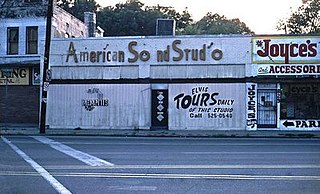
The American Sound Studio was a recording studio located in Memphis, Tennessee which operated from 1964 to 1972. Founded by Chips Moman, the studio at 827 Thomas Street came to be known as American North, and the studio at 2272 Deadrick Street came to be known as American East or the Annex.
Simply is an album by jazz singer Blossom Dearie that was released in 1982 on her label, Daffodil Records. Musicians on the album include Bob Dorough, Jay Berliner and Grady Tate.

It Takes a Whole Lot of Human Feeling is an album by American jazz vocalist Carmen McRae recorded in 1973 and released on the Groove Merchant label. The album's title track is a song from the 1971 musical Don't Bother Me, I Can't Cope.

Ms. Jazz is an album by American jazz vocalist Carmen McRae recorded in 1973 and released on the Groove Merchant label the following year.
















